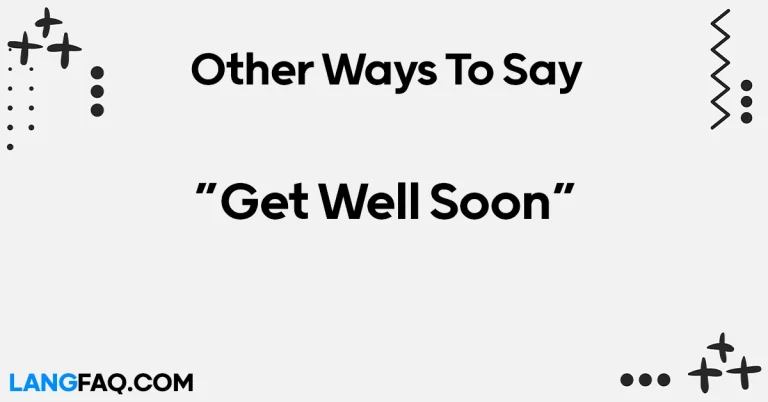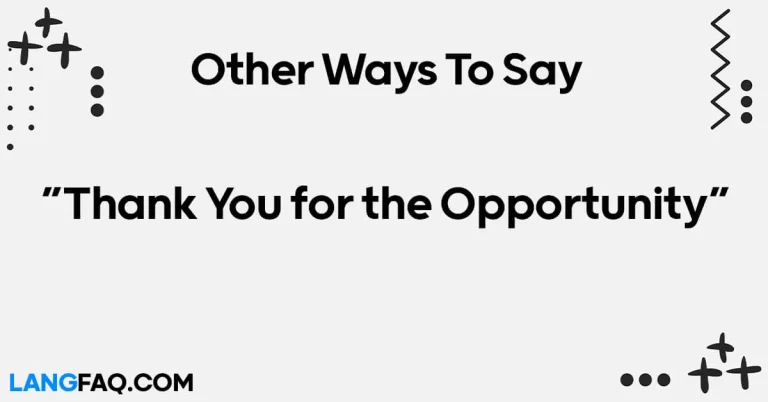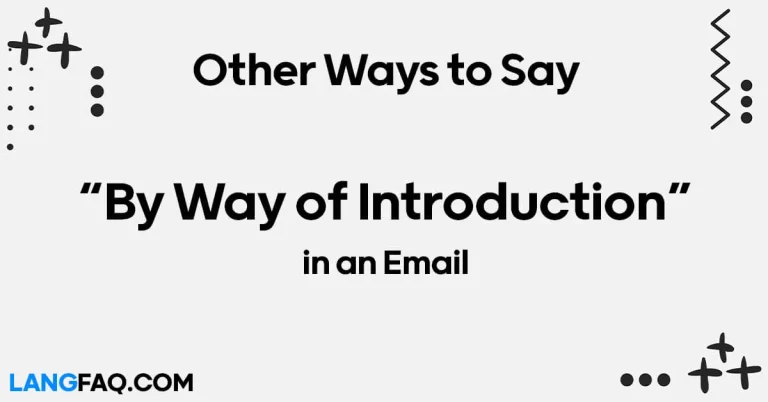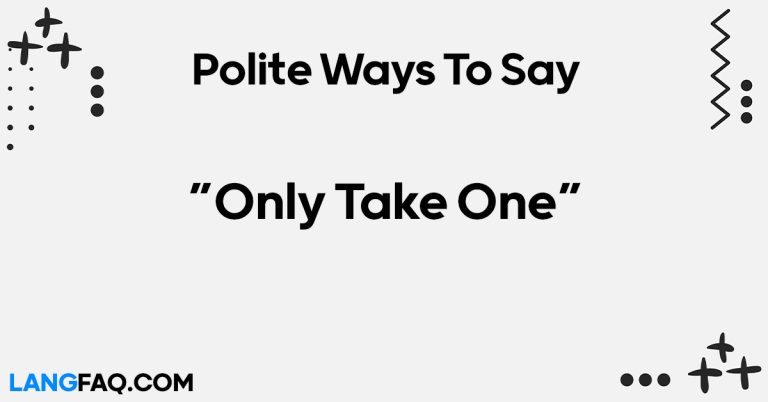Effective communication is the cornerstone of any successful interaction, and it begins with making others feel comfortable asking questions. In this article, we delve into creative alternatives to the often-used phrase “Let Me Know if You Have Any Questions,” providing insights to enhance your communication skills and build stronger connections.
12 Other Ways to Say “Let Me Know if You Have Any Questions”
Here are 12 other ways to express “Let Me Know if You Have Any Questions”:
- Feel free to ask if anything is unclear.
- Don’t hesitate to reach out with any questions.
- I’m here to help, so please ask anything you need.
- Should you have any inquiries, don’t hesitate to ask.
- Feel open to seek clarification or additional information.
- If there’s anything on your mind, feel free to ask me.
- I welcome any questions you might have.
- Please feel comfortable asking for further details.
- Should you need more information, feel free to inquire.
- I’m at your disposal for any questions you may have.
- If there’s something you’re unsure about, let me know.
- I’m here to assist, so don’t hesitate to ask questions.
Here’s a table with meanings and examples for the 12 alternatives to “Let Me Know if You Have Any Questions”:
| Expression | Meaning | Example |
|---|---|---|
| Feel free to ask if anything is unclear. | You’re encouraged to seek clarification. | “Feel free to ask if anything is unclear about the project.” |
| Don’t hesitate to reach out with any questions. | You’re welcome to contact for queries. | “Don’t hesitate to reach out with any questions you may have.” |
| I’m here to help, so please ask anything you need. | I’m available for assistance and inquiries. | “I’m here to help, so please ask anything you need guidance on.” |
| Should you have any inquiries, don’t hesitate to ask. | If you have questions, feel free to ask. | “Should you have any inquiries, don’t hesitate to ask for help.” |
| Feel open to seek clarification or additional information. | You’re encouraged to ask for more details. | “Feel open to seek clarification or additional information as needed.” |
| If there’s anything on your mind, feel free to ask me. | You’re invited to share any thoughts or concerns. | “If there’s anything on your mind, feel free to ask me about it.” |
| I welcome any questions you might have. | Your questions are appreciated and encouraged. | “I welcome any questions you might have regarding the presentation.” |
| Please feel comfortable asking for further details. | You’re urged to request additional information. | “Please feel comfortable asking for further details about the process.” |
| Should you need more information, feel free to inquire. | If you require additional details, ask freely. | “Should you need more information, feel free to inquire about the product.” |
| I’m at your disposal for any questions you may have. | I’m available to assist with your inquiries. | “I’m at your disposal for any questions you may have about the assignment.” |
| If there’s something you’re unsure about, let me know. | If you have uncertainties, inform me. | “If there’s something you’re unsure about, let me know, and I’ll clarify.” |
| I’m here to assist, so don’t hesitate to ask questions. | Feel free to seek assistance through questions. | “I’m here to assist, so don’t hesitate to ask questions if you need help.” |
These alternatives offer a variety of ways to express openness to questions, fostering effective communication by creating a welcoming atmosphere. Choosing the right phrase can enhance interactions and encourage others to seek clarification without hesitation.
Is It Correct to Say “Let Me Know if You Have Any Questions”?
Yes, the phrase “Let me know if you have any questions” is grammatically correct and commonly used in both written and spoken English. It is a polite and open-ended way to invite questions or seek clarification on a particular topic. This expression is frequently used in professional settings, emails, presentations, and everyday conversations.
The structure of the sentence is clear and straightforward. Here’s a breakdown:
- “Let me know”: This is an inviting phrase, indicating a willingness to receive information or feedback.
- “if you have any questions”: This part of the sentence specifies the type of information or feedback that is welcomed – questions. The use of “any” implies that all questions, regardless of number or nature, are encouraged.
This phrase is versatile and can be adapted to various situations. It is a courteous way to ensure that individuals feel comfortable seeking additional information or clarification.
Professional Mail Example With “Let Me Know if You Have Any Questions”
Subject: Project Update and Next Steps
Dear [Recipient’s Name],
I trust this email finds you well. I wanted to provide you with an update on the recent developments in our ongoing project and discuss the next steps moving forward.
Project Status: As of now, we have successfully completed the initial phase of the project, meeting the outlined milestones and deadlines. The team has been working diligently to ensure the quality and efficiency of our deliverables.
Upcoming Tasks: Looking ahead, our focus will shift towards the implementation of the new software system. We have scheduled a team meeting next Tuesday at 10 AM to discuss the detailed plan for this phase. Your input and feedback during this session will be invaluable to the success of the implementation.
Let Me Know if You Have Any Questions: I encourage you to review the attached document outlining the upcoming tasks and milestones. If you have any questions or require further clarification on any aspect, please do not hesitate to reach out. Your understanding and input are crucial to the seamless execution of this project.
Next Steps Meeting Details: Date: Tuesday, [Date] Time: 10:00 AM Location: [Virtual Meeting Link]
Your Participation Matters: Your insights and expertise are highly valued in our team, and your active participation in the upcoming meeting will greatly contribute to the success of this project. If there are specific points you’d like to discuss or elaborate on during the session, please feel free to share them beforehand.
I appreciate your continued dedication to this project, and I look forward to our collaborative efforts in ensuring its success.
Best regards,
[Your Full Name] [Your Position] [Your Contact Information]
Feel Free to Ask if Anything is Unclear
In a professional context, the phrase “Feel free to ask if anything is unclear” conveys openness and encourages questions without imposing. This expression is versatile and can be used in emails, meetings, or presentations. For instance:
Scenario: In a team meeting discussing a new project, you can say, “Feel free to ask if anything is unclear about the project timeline or goals. It’s essential that we’re all on the same page.”
Example Sentence: “Feel free to ask if anything is unclear regarding the client’s expectations, and I’ll provide clarification promptly.”
Email Sample:
Subject: Clarification on Project Specifications
“Hi Team,
Feel free to ask if anything is unclear regarding the updated project specifications. Your understanding is crucial for the success of our upcoming client presentation.
Best regards, [Your Name]”
Variations:
- Colleagues: “Feel free to ask if anything is unclear between now and our deadline.”
- Friends: “Feel free to ask if anything is unclear about the party details. I want everyone to be informed.”
- Mentor-Mentee: “Feel free to ask if anything is unclear in the guidance provided. I’m here to support your learning.”
Insight: Using “Feel free” adds a friendly tone, making the invitation for questions more approachable.
Don’t Hesitate to Reach Out with Any Questions
This phrase is inclusive and suggests that questions are not only welcome but expected. It’s suitable for both professional and personal settings.
Scenario: In a training session, you might say, “Don’t hesitate to reach out with any questions as we go through the material. It’s crucial for your understanding.”
Example Sentence: “Don’t hesitate to reach out with any questions about the new software. I’m here to guide you through the learning process.”
Email Sample:
Subject: Assistance with Onboarding Process
“Hello [New Team Member],
Don’t hesitate to reach out with any questions during your onboarding process. We want to ensure you feel comfortable in your new role.
Best regards, [Your Name]”
Variations:
- Colleagues: “Don’t hesitate to reach out with any questions before our client presentation.”
- Friends: “Don’t hesitate to reach out with any questions about the upcoming trip. I’ve got all the details.”
- Mentor-Mentee: “Don’t hesitate to reach out with any questions about your career path. I’m here to provide guidance.”
Insight: “Don’t hesitate” reassures the person that asking questions is natural and expected.
I’m Here to Help, So Please Ask Anything You Need
This phrase establishes a supportive tone, emphasizing your availability for assistance. It works well in professional settings, ensuring others feel comfortable seeking guidance.
Scenario: During a team brainstorming session, you can say, “I’m here to help, so please ask anything you need. Let’s collaborate to find the best solutions.”
Example Sentence: “I’m here to help, so please ask anything you need regarding the upcoming project. Your insights are valuable.”
Email Sample:
Subject: Support for Upcoming Project
“Hi Team,
I’m here to help, so please ask anything you need as we dive into the details of the upcoming project. Let’s work together for success.
Best regards, [Your Name]”
Variations:
- Colleagues: “I’m here to help, so please ask anything you need before our department meeting.”
- Friends: “I’m here to help, so please ask anything you need for the party preparations. I’ve got your back.”
- Mentor-Mentee: “I’m here to help, so please ask anything you need guidance on for your professional development.”
Insight: Expressing availability and willingness to assist fosters a collaborative environment.
Should You Have Any Inquiries, Don’t Hesitate to Ask
This slightly formal expression maintains a professional tone, suitable for emails, reports, or meetings where a polished language is preferred.
Scenario: In a client presentation, you might say, “Should you have any inquiries, don’t hesitate to ask. Clear communication is vital for a successful partnership.”
Example Sentence: “Should you have any inquiries about the financial report, don’t hesitate to ask. Accuracy is our priority.”
Email Sample:
Subject: Clarification on Client Requirements
“Dear [Client],
Should you have any inquiries about the recent project requirements, don’t hesitate to ask. Your satisfaction is our top priority.
Best regards, [Your Name]”
Variations:
- Colleagues: “Should you have any inquiries about the upcoming merger, don’t hesitate to ask during the meeting.”
- Friends: “Should you have any inquiries about the travel itinerary, don’t hesitate to ask. I want everyone to be well-informed.”
- Mentor-Mentee: “Should you have any inquiries about career decisions, don’t hesitate to ask. I’m here to provide insights.”
Feel Open to Seek Clarification or Additional Information
This expression emphasizes creating an open space for questions and additional information, promoting transparency and understanding.
Scenario: In a team training workshop, you might say, “Feel open to seek clarification or additional information as we cover the new policies. Your understanding is crucial for compliance.”
Example Sentence: “Feel open to seek clarification or additional information about the project timeline. I want everyone to be well-informed.”
Email Sample:
Subject: Additional Information on Project Requirements
“Hi Team,
Feel open to seek clarification or additional information about the recent changes in project requirements. Your thorough understanding is essential.
Best regards, [Your Name]”
Variations:
- Colleagues: “Feel open to seek clarification or additional information before our client meeting.”
- Friends: “Feel open to seek clarification or additional information about the event. I want everyone to have all the details.”
- Mentor-Mentee: “Feel open to seek clarification or additional information about your career path. I’m here to provide guidance.”
Insight: Encouraging individuals to “feel open” invites a sense of comfort in seeking more information.
If There’s Anything on Your Mind, Feel Free to Ask Me
This phrase is an invitation to share thoughts, concerns, or questions, fostering open communication in various contexts.
Scenario: In a team collaboration session, you can say, “If there’s anything on your mind, feel free to ask me. Your insights contribute to our collective success.”
Example Sentence: “If there’s anything on your mind about the new project, feel free to ask me. I value your input.”
Email Sample:
Subject: Open Discussion on New Initiatives
“Hello Team,
If there’s anything on your mind regarding the new initiatives, feel free to ask me. Let’s have an open discussion for better collaboration.
Best regards, [Your Name]”
Variations:
- Colleagues: “If there’s anything on your mind before our team retreat, feel free to ask me.”
- Friends: “If there’s anything on your mind about our upcoming trip, feel free to ask me. I want everyone to be excited.”
- Mentor-Mentee: “If there’s anything on your mind about your career decisions, feel free to ask me. I’m here to provide support.”
I Welcome Any Questions You Might Have
This expression sets a positive tone, signaling openness to questions and encouraging engagement in professional and collaborative environments.
Scenario: During a team-building workshop, you might say, “I welcome any questions you might have about our team goals. Open communication is key to our success.”
Example Sentence: “I welcome any questions you might have about the new policies. Your input is valued.”
Email Sample:
Subject: Q&A Session on New Company Policies
“Dear Team,
I welcome any questions you might have during our upcoming Q&A session on the new company policies. Your participation is crucial for clarity.
Best regards, [Your Name]”
Variations:
- Colleagues: “I welcome any questions you might have before our budget planning meeting.”
- Friends: “I welcome any questions you might have about the party arrangements. Let’s make it memorable together.”
- Mentor-Mentee: “I welcome any questions you might have about your career development. I’m here to guide you.”
Insight: The phrase “I welcome” creates a sense of hospitality and openness in communication.
Please Feel Comfortable Asking for Further Details
This expression encourages individuals to seek more information, ensuring a thorough understanding of the subject matter.
Scenario: In a project kickoff meeting, you can say, “Please feel comfortable asking for further details about the project milestones. Clarity is essential for our success.”
Example Sentence: “Please feel comfortable asking for further details about the client’s expectations. Your thorough understanding is our priority.”
Email Sample:
Subject: Additional Information on Client Presentation
“Hi Team,
Please feel comfortable asking for further details about the client presentation. It’s crucial that we present a comprehensive overview.
Best regards, [Your Name]”
Variations:
- Colleagues: “Please feel comfortable asking for further details before our departmental review.”
- Friends: “Please feel comfortable asking for further details about the upcoming trip. I want everyone to be well-prepared.”
- Mentor-Mentee: “Please feel comfortable asking for further details about your career goals. I’m here to provide insights.”
Should You Need More Information, Feel Free to Inquire
This formal expression encourages individuals to seek additional information, making it suitable for professional contexts where clarity is paramount.
Scenario: In a client meeting, you might say, “Should you need more information, feel free to inquire about our services. We aim for transparency in all our client interactions.”
Example Sentence: “Should you need more information about the project timeline, feel free to inquire. We want to ensure you have all the details you need.”
Email Sample:
Subject: Inquiry on Product Specifications
“Dear [Client],
Should you need more information on the product specifications, feel free to inquire. We’re here to provide the details you require.
Best regards, [Your Name]”
Variations:
- Colleagues: “Should you need more information before our team presentation, feel free to inquire.”
- Friends: “Should you need more information about the weekend plans, feel free to inquire. I want everyone to be excited.”
- Mentor-Mentee: “Should you need more information about career options, feel free to inquire. I’m here to guide you.”
Insight: The use of “inquire” adds a touch of formality, suitable for professional inquiries.
I’m at Your Disposal for Any Questions You May Have
This phrase conveys a sense of availability and willingness to assist, creating an open door for questions in both formal and informal settings.
Scenario: In a team brainstorming session, you might say, “I’m at your disposal for any questions you may have about our project goals. Let’s ensure everyone is on the same page.”
Example Sentence: “I’m at your disposal for any questions you may have about the upcoming event. Your input is valuable to its success.”
Email Sample:
Subject: Assistance with Project Planning
“Hi Team,
I’m at your disposal for any questions you may have during our project planning phase. Let’s collaborate for success.
Best regards, [Your Name]”
Variations:
- Colleagues: “I’m at your disposal for any questions you may have before our client meeting.”
- Friends: “I’m at your disposal for any questions you may have about the party. Let’s make it amazing together.”
- Mentor-Mentee: “I’m at your disposal for any questions you may have about your career development. I’m here to support you.”
If There’s Something You’re Unsure About, Let Me Know
This expression invites others to share uncertainties, emphasizing openness and a willingness to provide clarification.
Scenario: In a project review meeting, you might say, “If there’s something you’re unsure about, let me know. It’s crucial that we address any concerns to ensure project success.”
Example Sentence: “If there’s something you’re unsure about regarding the new procedures, let me know. Your clarity is essential for compliance.”
Email Sample:
Subject: Seeking Clarification on Project Guidelines
“Hello Team,
If there’s something you’re unsure about regarding the project guidelines, let me know. I’m here to provide the necessary clarification.
Best regards, [Your Name]”
Variations:
- Colleagues: “If there’s something you’re unsure about before our departmental audit, let me know.”
- Friends: “If there’s something you’re unsure about for the weekend plans, let me know. I want everyone to be comfortable.”
- Mentor-Mentee: “If there’s something you’re unsure about in your career path, let me know. I’m here to guide you.”
Insight: Inviting others to share uncertainties fosters a culture of openness and continuous improvement.
I’m Here to Assist, So Don’t Hesitate to Ask Questions
This phrase combines a supportive tone with an explicit encouragement to ask questions, suitable for various professional and personal interactions.
Scenario: In a team training session, you might say, “I’m here to assist, so don’t hesitate to ask questions about the new software. Your understanding is crucial for efficient workflow.”
Example Sentence: “I’m here to assist, so don’t hesitate to ask questions about the upcoming project. Your insights are valuable to its success.”
Email Sample:
Subject: Assistance with New Software Implementation
“Hi Team,
I’m here to assist, so don’t hesitate to ask questions about the new software implementation. Let’s ensure a smooth transition.
Best regards, [Your Name]”
Variations:
- Colleagues: “I’m here to assist, so don’t hesitate to ask questions before our client presentation.”
- Friends: “I’m here to assist, so don’t hesitate to ask questions about the party preparations. I’ve got your back.”
- Mentor-Mentee: “I’m here to assist, so don’t hesitate to ask questions about your career development. I’m here to support you.”
Using Positive Language
Employing positive language is a powerful way to encourage questions while maintaining an optimistic atmosphere in both professional and personal settings.
Scenario: During a team strategy meeting, you might say, “Using positive language, feel free to ask any questions about our new goals. Let’s focus on constructive discussions for our team’s success.”
Example Sentence: “Using positive language, feel free to ask any questions about the marketing campaign. Your ideas contribute to our positive outcomes.”
Email Sample:
Subject: Positive Discussion on Project Vision
“Hello Team,
Using positive language, feel free to ask any questions about our project vision. Let’s create a positive and collaborative environment for success.
Best regards, [Your Name]”
Variations:
- Colleagues: “Using positive language, feel free to ask any questions before our strategic planning meeting.”
- Friends: “Using positive language, feel free to ask any questions about our upcoming adventure. Let’s keep the excitement flowing.”
- Mentor-Mentee: “Using positive language, feel free to ask any questions about your career path. Your positive approach matters.”
Insight: Infusing positivity into communication creates an uplifting environment, fostering enthusiasm and collaboration.
Wrapping Up Conversations
Knowing how to gracefully conclude a conversation while leaving room for questions is an essential skill. It sets a positive tone and ensures clarity.
Scenario: After presenting a project update, you might say, “As we’re wrapping up, feel free to ask any final questions about the project. I appreciate everyone’s engagement.”
Example Sentence: “As we’re wrapping up our discussion on the new policies, feel free to ask any final questions. Your insights have been valuable.”
Email Sample:
Subject: Closing Remarks and Final Questions
“Hi Team,
As we’re wrapping up our discussion on the project, feel free to ask any final questions. I want to ensure everyone is clear before we conclude.
Best regards, [Your Name]”
Variations:
- Colleagues: “As we’re wrapping up our quarterly review, feel free to ask any final questions.”
- Friends: “As we’re wrapping up our planning for the weekend, feel free to ask any final questions. Let’s make it memorable.”
- Mentor-Mentee: “As we’re wrapping up our session on career development, feel free to ask any final questions. Your growth matters.”
FAQs
Are these alternatives suitable for professional emails?
Yes, many of these alternatives can be seamlessly integrated into professional emails to convey a welcoming and approachable tone.
How can I encourage questions without appearing pushy?
Using phrases that express availability and a genuine willingness to assist can encourage questions without imposing on others.
Are there cultural considerations for these alternatives?
Absolutely, it’s essential to be mindful of cultural nuances. Choose alternatives that align with the formality and expectations of the given cultural context.
Can these alternatives be used in customer service interactions?
Certainly, incorporating these phrases in customer service interactions can enhance the customer experience by making them feel valued and supported.
Do these alternatives work in virtual communication?
Yes, these alternatives are versatile and can be applied to various communication channels, including virtual meetings, emails, and messaging.
How do I handle situations where I genuinely don’t know the answer?
Being honest is key. Use phrases that express your willingness to find the information or direct the person to someone who can assist them.
Conclusion
Enhancing your communication skills involves more than mastering vocabulary; it’s about creating connections. By exploring these 12 alternatives, you can transform routine interactions into opportunities for meaningful dialogue. Remember, effective communication is a journey, not a destination.







